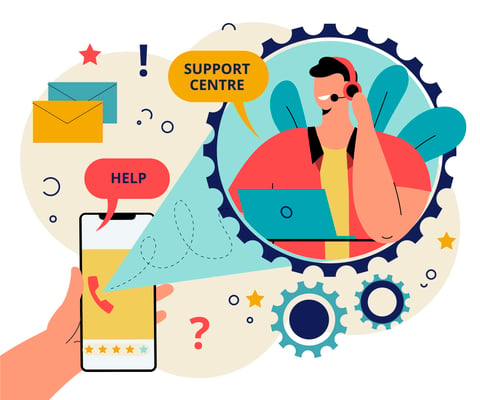Navigating the landscape of customer service can be a complex task for contact centres striving for consistency and excellence. The challenge lies in delivering superior experiences that align with the ever-changing expectations of customers.
This article dives into the six proven best practices for contact centres, helping you enhance performance, streamline operations, and elevate the overall efficiency of your contact centre.
1. Implement multi-channel support
78% of customers have used multiple channels to start and complete a transaction. This shows how customers prefer to use multi-channel platforms to engage with businesses.
With a comprehensive multichannel support system, businesses can avoid creating fragmented customer journeys. This approach eliminates communication gaps, reduces query resolution times, and significantly enhances the overall quality of the customer experience.

By seamlessly integrating diverse communication channels such as email, chat, and social media, businesses can meet customers where they are. This not only ensures a consistent and efficient customer service experience but also demonstrates a commitment to adapting to customer preferences and expectations.
For instance, eServ’s comprehensive multichannel customer support is designed to cater to diverse preferences and ensures efficient issue resolution, regardless of how customers reach out.
With expertise across telephone calls, emails, live chats, apps, and social media platforms, our agents guarantee a consistent and effective support experience.
We facilitate a seamless transition between channels, providing real-time responses and maintaining consistency in service quality—a strategy that builds trust and reinforces a unified brand image.
2. Set clear service standards
Setting clear service standards provides a roadmap for consistent and high-quality customer interactions, fostering customer satisfaction and loyalty.
Clearly defined standards help agents understand expectations, ensuring a unified approach to service delivery. Take a look at some examples of service standards:
- Response time: Aim to respond to customer inquiries within a specified time frame, such as 24 hours for email inquiries or immediately for urgent issues via live chat or phone.
- Issue resolution time: Establish a standard time frame within which customer issues should be resolved, promoting efficient problem-solving and customer satisfaction.
- First-contact resolution: Aim to solve customer issues in the first interaction, avoiding the need for additional contacts and ensuring a smoother customer experience.
- Compliance with SOP: Follow Standard Operating Procedures (SOP) to maintain consistency, sticking to established guidelines in providing services to ensure reliability and quality.
- Soft skills: Improve interpersonal skills like communication and empathy to create a positive and friendly interaction with customers.
Clearly communicate these standards to all team members and provide regular training sessions to reinforce them.
Regularly evaluate performance against these standards and use feedback to refine and improve processes. By setting and maintaining clear service standards, contact centres can enhance customer experiences, build trust, and meet organisational objectives effectively.
3. Provide ongoing training to agents

Ongoing training empowers agents with the knowledge and skills needed to handle evolving customer needs, new technologies, and emerging industry trends.
To facilitate this continuous learning, contact centres should provide regular training sessions, workshops, and access to online resources. They can cover a range of topics such as customer service techniques, product knowledge, and new technologies.
By prioritising ongoing training, contact centres not only invest in the professional development of their agents but also ensure that they stay well-equipped to provide excellent customer service.
This commitment to continuous learning contributes to a more skilled, confident, and adaptable workforce, ultimately enhancing the overall effectiveness and success of the contact centre.
Looking to outsource training and development? We can help.
With comprehensive training solutions customized to your needs, eServ can help you empower your team's skills and nurture a culture of constant growth.
4. Ensure data security and privacy
Prioritising data security establishes trust with customers, assuring them that their personal information is handled with the utmost care and diligence.
This involves a combination of stringent protocols, employee training, and continuous monitoring.
Begin by defining clear policies for the collection, storage, and transmission of customer data. Limit access to sensitive information only to authorized personnel and regularly update access credentials.
Regularly audit systems, conduct vulnerability assessments, and update security measures to stay ahead of potential threats.
By integrating these measures into the contact centre's culture, organizations can create a secure environment, safeguard customer data, and meet regulatory requirements effectively.
5. Optimise interaction handling processes
Optimising interaction handling processes reduces response times, minimises errors, and ensures a more seamless flow of customer interactions.
This not only contributes to increased customer satisfaction but also positively impacts operational costs by maximising agent productivity. Improved processes enable a more agile response to customer needs, fostering loyalty and positive brand perception.
Here are some ways to enhance interaction handling processes:
- Conduct a thorough analysis of the current workflow and identify bottlenecks, areas of redundancy, and opportunities for automation
- Implement technologies like chatbots and interactive voice response (IVR) systems to efficiently handle routine queries, allowing live agents to focus on more complex issues
- Standardise procedures to ensure consistency across all interactions, reducing the likelihood of errors
- Provide ongoing training to agents, equipping them with the skills needed to navigate optimised processes effectively
- Regularly review and update processes based on customer feedback and performance metrics
By systematically refining and modernising interaction handling, contact centres can achieve operational excellence and deliver a more satisfying customer experience.
6. Gather and analyse customer feedback
Customer feedback provides invaluable insights into their experiences, preferences, and areas where the contact centre can enhance its services.
Actively seek customer feedback to identify strengths, address weaknesses, and make informed decisions to align services with customer expectations.
Implement short surveys immediately after customer interactions, whether through phone calls, emails, live chats, or following the resolution of a support ticket.
You can also integrate IVR surveys into phone systems to gather feedback on the customer's experience with the interactive menu and the overall service.
Regularly analyse this feedback to pinpoint trends and uncover pain points.
The feedback loop not only facilitates better decision-making but also fosters a customer-centric culture, demonstrating responsiveness and a commitment to delivering an exceptional customer experience.
Wrapping up
At a time when every interaction shapes the customer experience, using these contact centre best practices is key to success.
It is not only about solving customer service challenges; it is about making each interaction a positive and memorable experience. By adopting these practices, contact centres don't just keep up—they stand out as trusted partners in delivering exceptional customer journeys.
eServ has contact centre solutions designed for that.
Whether you prefer calls, emails, live chats, or in-person visits, our 24/7 support and advanced tools ensure top-notch service. Let's transform your customer journey together—contact us for a reliable partner in delivering exceptional experiences.

